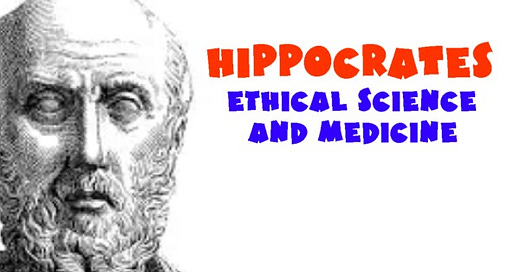This video is available to everyone for a limited time. Paid subscribers will have access to this and all other videos and bonus content. Please consider upgrading to a paid subscription to enjoy and support this project. If you pay to subscribe I’ll also read your name out at the end of the video.
You can also obtain the benefits of a paid subscription by sharing Three Minute Philosophy with others. For each new friend you bring in, you earn benefits. So spread the word!
For the full archive of videos so far, visit https://www.speterdavis.com/philosophy/
Hippocrates of Cos was a Greek physician who lived around 400 BC on the island of Cos, and despite the similar sounding name he has no connection to the word hypocrisy, but he is the namesake of the Hippocratic Oath, the medical oath that practicing physicians take to this day.
Sort of.
The thing about the Hippocratic Oath that doctors take today is first of all that it doesn’t closely resemble the one that was written originally, and also, the original oath might not have been written by Hippocrates. Like many philosophical texts that have survived from that era, it’s difficult to know how many of the writings attributed to Hippocrates, known as the Hippocratic Corpus, were actually written by him as opposed to his followers.
But although it’s been revised and updated over the years the gist of the Hippocratic oath is often abbreviated to something like “First, Do No Harm.”
Back in Hippocrates’ time there was really no way to tell who was a qualified medical practitioner because there was no such thing as an accredited med school and there wasn’t any kind of official registry, so anyone could just pretty much say they knew what they were doing.
Hippocrates recognised that this was a problem and so he and his followers decided that a solution would be if the actually qualified people wrote their findings down in some kind of official body of work and took one particular oath. Kind of like a clubhouse password for people who know how to treat a head injury.
It’s the earliest known example of a professional code of conduct, as well as a broadly agreed upon standard body of medical knowledge, many centuries before Gray’s Anatomy (the book, not the show).
That doesn’t mean that everything Hippocrates and his believers thought about medicine was correct.
Hippocrates was very familiar with Empedocles, who believed everything and everyone was made out of different combinations of air, water, fire, and earth. Although philosophy and science had moved past that idea, Hippocrates still thought it was useful to think of the human body as a balance of four substances.
For Hippocrates, the four primary substances of the human body were called humours and they were blood, phlegm, yellow bile, and black bile.
You already know what blood and phlegm are, of course, and yellow bile is digestive fluid. If you’re confused about what black bile represents, that’s because Hippocrates kind of made that one up. He had to get to four somehow, but it’s curious that he had to imagine something when there are so many other interesting liquids that come out of the human body he could have picked from.
But the theory was that diseases and moods were caused by the proportions of these humours being out of balance. Each humour was associated with one of the four basic temperaments which were, roughly: Happy, sad, angry, and calm. Or as they were known to Hippocrates: Sanguine, melancholic, choleric, and phlegmatic.
For example if you were depressed all the time you might be diagnosed with having too much black bile in your body, whereas if you’re too zany you might have too much blood. The treatment for this was sometimes dubious procedures like bloodletting.
But this kind of procedure was probably rare, because the Hippocratic oath compelled physicians to put the safety of their patients above everything else. So Hippocrates probably saved a lot of ancient Greek people from unnecessary exploratory surgery.
This of course was all a very long time before any modern theories of disease, so everything from contagious disease, to congenital disease, to mental illness, to just, severe mood swings were all sort of lumped together under the four humours theory.
But much more than his blood and snot theory, which was improved upon quite a lot over the next 2000 years, Hippocrates is more important for his foundational role in developing scientific ethics. And although medicine’s track record has not been perfect on this, it’s still means it’s unlikely that your surgeon will inject you with something they found in the back of the refrigerator just to see what happens.
Sources:
Adamson, Peter., Classical Philosophy: A history of philosophy without any gaps. Oxford University Press, 2014
Boylan, M., Hippocrates. Internet Encyclopedia of Philosophy. Retrieved 2025.
Lagay, F., History of Medicine: The Legacy of Humoral Medicine. American Medical Association Journal of Ethics, 4(7) July 2002.
What you get for subscribing:
Three Minute Philosophy is a fun and educational series of videos and essays about the history of philosophy.
Essays are free. Paid subscribers will gain access to full videos, printable PDFs, and possibly more in time.
Listen to this episode with a 7-day free trial
Subscribe to Three Minute Philosophy to listen to this post and get 7 days of free access to the full post archives.












